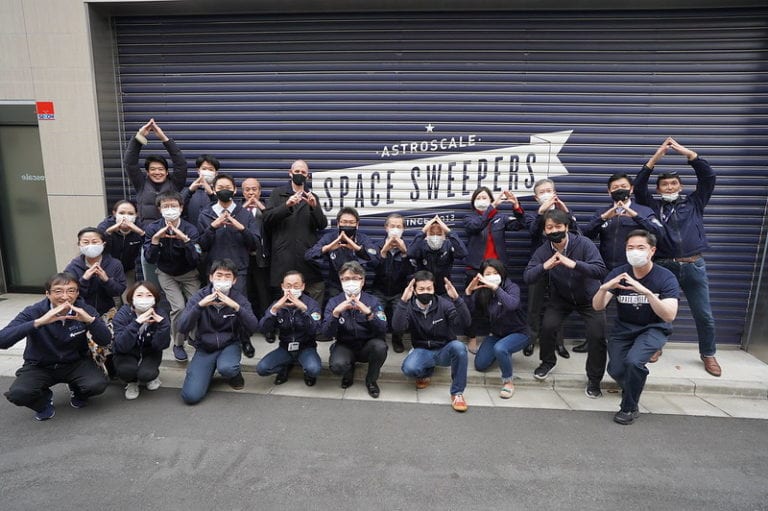Latest News

The Astroscale team (photo: Astroscale)
Astroscale, the Japanese startup that wants to remove dangerous clutter from an already congested space environment, reached a critical milestone with the successful launch of its ELSA-D debris removal spacecraft early Monday morning.
Russia’s GK Launch Services sent ELSA-D into space on a Soyuz rocket from the Baikonur Cosmodrome in Kazakhstan. The mission was originally scheduled to take place early Saturday morning, but was pushed back due to technical issues detected on the rocket before launch.
Once in orbit and activated, the ELSA-D will conduct a six-month “End-of-Life” on-orbit servicing demonstration. Astroscale said the mission, which is licensed by the UK Space Agency, is the world’s first commercial mission to demonstrate the core technologies necessary for space debris docking and removal. Surrey Satellite Technology Ltd (SSTL) built the ELSA-d satellite and shipped it to Astroscale in 2019. The spacecraft incorporates S-Band communications, GPS positioning, a 3-axis control system, and an HD camera to capture operations in orbit on video.
“This landmark mission will also enable better-informed policy developments and drive the business case for on-orbit services such as end-of-life and active debris removal,” said Astroscale Founder and CEO Nobu Okada. “This is an incredible moment, not only for our team, but for the entire satellite servicing industry, as we work towards maturing the debris removal market and ensuring the responsible use of our orbits.”
Okada founded Astroscale in 2013 and has since grown the company into a global organization with nearly 200 employees and major divisions in the United States, Israel, Singapore, and Europe. He was recently nominated for Via Satellite’s Executive of the Year Award.
In an interview with Via Satellite in October, Astroscale CEO Nobu Okada said with the ELSA-d mission will open up a new value chain of servicing in the space industry. “Once the servicer gets closer to the client satellite, we will identify the rotation rate and then dance with the client and capture it, stabilize it and bring it down to the atmosphere,” Okada said. “This is the first demonstration of capturing uncontrolled objects. This will open the door for the new value chain.”
UK Science Minister Amanda Solloway touted her government’s involvement in the ELSA-D mission. “I am proud the UK Government not only helped make this mission a reality but is Europe’s largest investor in helping with space clean-up. As we build back better, we will continue to drive growth by investing in the technologies that have made today’s breakthrough possible,” said Solloway.
Astroscale is the most-funded on-orbit services specialist company, and the highest funded Japanese space startup in history. The company closed its Series E funding round in October with additional funding of $51 million, which at the time, put the company at just under $200 million in total financing.
ELSA-D wasn’t the only UK Space Agency-backed spacecraft to launch on the GK Launch Services Soyuz-2 rideshare mission.
Oxford-based space technology company Open Cosmos launched its first two satellites that it produced at its newly expanded DISC facilities at the Harwell Campus space research and development center. The satellites aims to bring 5G and IoT connectivity to local governments and business in extremely remote regions around the world.
“With £300bn of wider UK GDP supported by satellite services, Open Cosmos is key to unlocking these services and making them more accessible for businesses and governments across the world,” said Open Cosmos CEO Rafel Jordá, who founded the company in 2016. “We’re also extremely proud that Monday’s launches have been made possible by working closely with the UKSA, ESA, the Catapult and all our partner companies at Harwell Campus and abroad. We look forward to continuing to push forward the potential for UK space tech in 2021 and beyond.”
The GK Launch Services mission also sent the South Korean Earth observation satellite CAS500-1, and around 30 other satellites, to orbit.
Get the latest Via Satellite news!
Subscribe Now